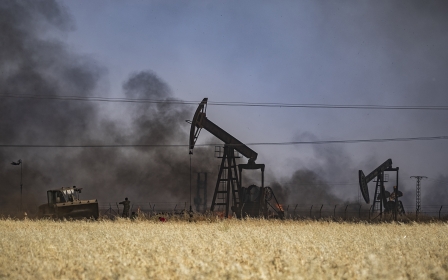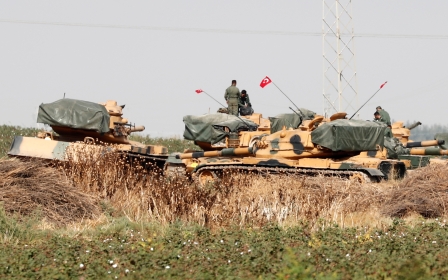Turkey to request that US extradite Syrian Kurdish commander

Turkey is set to request the extradition of a Syrian Kurdish commander once he arrives in the United States, Turkish Justice Minister Abdulhamit Gul said on Friday - some two weeks after Turkey began an offensive in northern Syria to capture territories held by Kurdish militias.
Speaking to reporters, Gul said the Turkish foreign ministry had conveyed the extradition request to the US.
Turkish President Recep Tayyip Erdogan has said that he would formally call on the US to hand over the top Syrian Democratic Forces (SDF) general Mazloum Abdi, whom the US president Donald Trump has repeatedly praised over the past two weeks.
US senators have urged the State Department to provide a visa to Abdi to visit Washington to discuss developments in Syria. But Ankara has slammed the proposed move.
"Mazloum is a terrorist sought with a red notice. What does this mean? ... The United States needs to hand over this man to us because he is wanted with a red notice," Erdogan said in a broadcast interview on Thursday.
New MEE newsletter: Jerusalem Dispatch
Sign up to get the latest insights and analysis on Israel-Palestine, alongside Turkey Unpacked and other MEE newsletters
Until Trump announced US troops were pulling out of northern Syria, the US had backed the Kurdish-led SDF in its fight against the Islamic State (IS) group in Syria.
But Turkey, which has battled separatist Kurdish militants on its own soil for decades, views the fighters as a threat to its national security.
Abdi has accused Turkey and its allies of continuing the military offensive despite announcing a truce. He also called for the ceasefire's backers to "rein in the Turks".
Erdogan confirmed on Thursday that he would visit Washington next month, despite objections from US lawmakers seeking to rebuke Ankara over its offensive against Kurdish fighters in northern Syria.
Turkey began its offensive in northern Syria earlier this month, after Trump withdrew US forces from the area, a move that effectively gave Ankara a green light for the incursion.
In the face of mounting anger from activists and lawmakers who accused him of betraying America's Kurdish allies, Trump imposed sanctions on Turkey on 14 October over its Syria offensive.
But on Wednesday, the Trump administration lifted the sanctions after Washington and Ankara reached a ceasefire agreement that the Turkish government would halt its offensive in exchange for the withdrawal of Kurdish fighters from areas along the Turkish-Syrian border.
Ankara has also agreed to a similar deal with Moscow, which backs the government of President Bashar al-Assad in Damascus.
Middle East Eye delivers independent and unrivalled coverage and analysis of the Middle East, North Africa and beyond. To learn more about republishing this content and the associated fees, please fill out this form. More about MEE can be found here.




